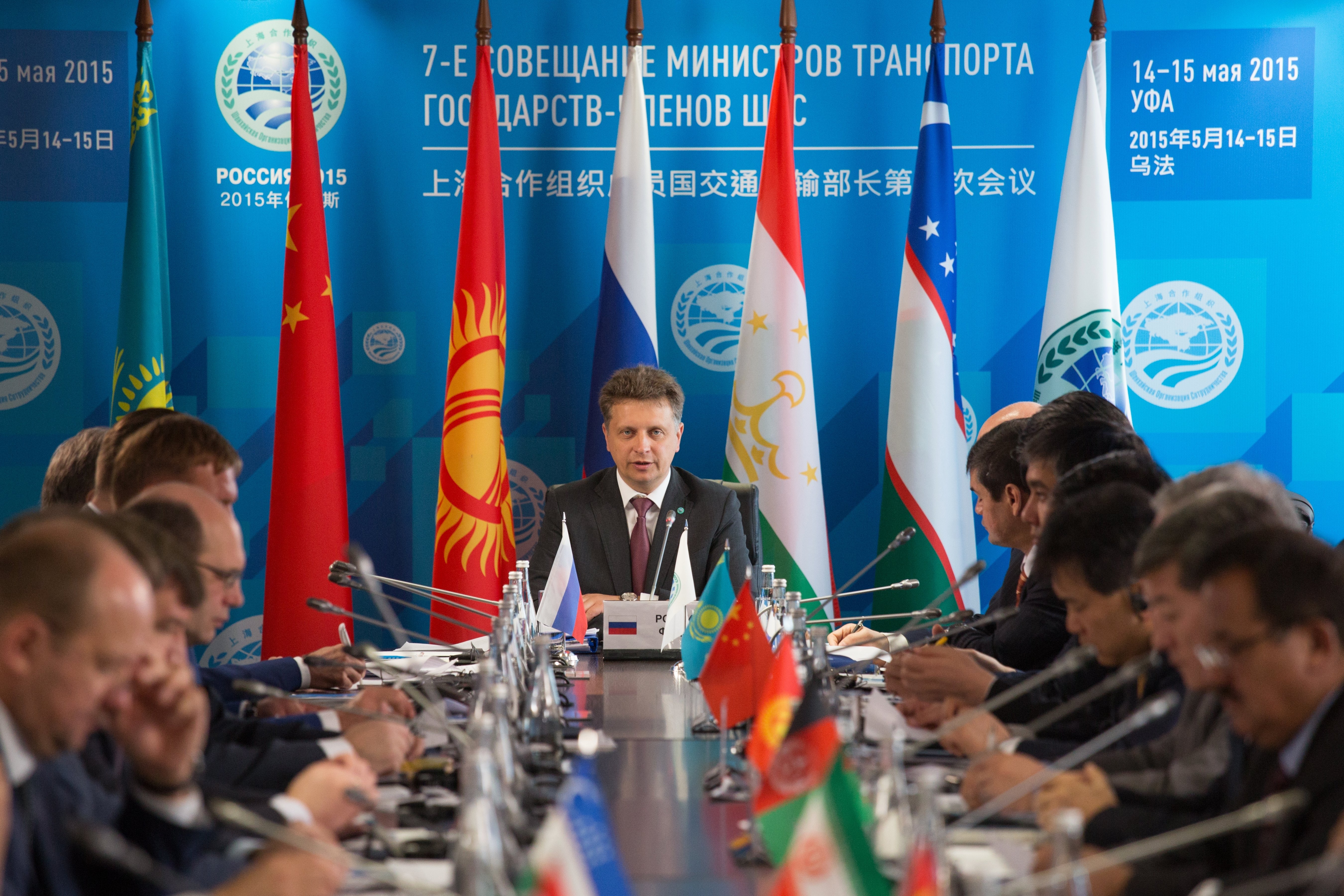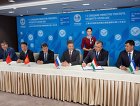
SCO transport ministers discuss road development in Ufa

The 7th SCO Transport Ministers Meeting was held in Ufa.
It was attended by Russian Minister Transport Maxim Sokolov, Minister of Investment and Development of the Republic of Kazakhstan Aset Isekeshev, Minister of Transport of the People's Republic of China Yang Chuantang, Minister of Transport and Communications of the Kyrgyz Republic Argynbek Malabayev, Minister of Transport of the Republic of Tajikistan Sherali Ganjalzoda, First Deputy Chair of the Board of Uzbekistan Railways Davron Dekhanov, Minister of Transport and Civil Aviation of the Islamic Republic of Afghanistan Batash Mohammadullah, Mongolia's Minister of Roads and Transport Namhai Tumurkhuu, Deputy Minister of Internal Transport of the Republic of Sri Lanka Mohammad Shariff Thoufeek, Minister of Transport and Communications of the Republic of Belarus Anatoly Sivak, SCO Secretary-General Dmitry Mezentsev, International Road Transport Union Secretary General Umberto de Pretto and representatives of UNESCAP.
Opening the meeting, Minister of Transport Maxim Sokolov said the choice of its venue was not accidental. "The Republic of Bashkortostan is among Russia's top ten regions in economic development. Its transport network supports Russia's foreign trade with other SCO countries. Ufa is one of Russia's largest economic, cultural, sport, scientific and transport centres. In effect, Ufa is the SCO capital because in two months, in July, it will host the SCO Summit," he said.
Mr Sokolov said Russia attaches much importance to the mission of its SCO Presidency, identifying Russia's priorities for the current year as enhancing the SCO's role as an effective mechanism of regional security, launching large multilateral infrastructure projects, deepening cooperation and elaborating a common approach to urgent regional and global issues.
The minister called transport one of the priority areas of cooperation between the SCO countries. "Modern infrastructure can be the key to implementing many business projects and major initiatives on developing advanced production lines and quality jobs," he said.
Mr Sokolov told the participants about the Russian-Chinese plans to merge the transit capacities of Russia's Trans-Siberian Railway, the Baikal-Amur Mainline and China's Silk Road Economic Belt. In his view, such major projects will promote the interests of the SCO member states and other Eurasian countries by merging the development strategies of countries along the Silk Road. They will allow the regional market to unlock its potential, promote investment and consumption, and create demand and jobs.
Mr Sokolov also read Prime Minister Dmitry Medvedev's official address to the participants.
The heads of the delegations discussed the status and prospects of multilateral transport cooperation in the SCO. They emphasised that the key task of the transport sector is to develop infrastructure and implement large-scale joint projects in the sphere of transport, logistics and communications, which will make it possible to substantially increase mutual trade, create new markets, encourage regional development and build a modern ramified transport network in Eurasia.
The participants affirmed the need to continue implementing the agreement among the governments of the SCO member states on international road transportation facilitation that was signed at the SCO Heads of State Council Meeting on September 11-12, 2014 in Dushanbe, Republic of Tajikistan.
They also agreed to choose their representatives for the joint commission on international road transportation facilitation at the level of SCO deputy ministers responsible for drafting government policy on transport who would form the commission's national groups.
There was a consensus view that in order to consistently develop international road transport in the region it is necessary to continue building road infrastructure, develop integrated service centres on the SCO's international roads, introduce eco-friendly technology and expand the use of natural gas fuel. They agreed to quickly adopt the programme for the coordinated development of SCO roads, and noted the importance of continuing work on the proposals for a draft programme by the SCO Special Working Group on Transit Potential Development as a means of developing SCO trade and economic cooperation and helping to provide competitive transport services for the SCO economies. The SCO foreign trade ministers were advised to discuss relevant adjustments to the work of this working group at their meeting.
Among the future priorities, the sides mentioned joint infrastructure projects designed to expand the transport and communication capabilities of the region, to develop rail transport, including high-speed rail, to build international multi-modal logistics centres, and to introduce advanced and innovative transport technology. In these areas, it makes sense to actively use the potential of observer states and dialogue partners, as well as the capabilities of international development banks, such as the SCO Development Bank.
Heads of delegations noted with satisfaction the good results of major sporting events held in the SCO member states in 2014 and the organisation of their transport support, which were discussed during the international conference held in Ufa on 15 May whose participants shared their experiences in organising transport support for major sporting events. The sides agreed to continue to share information and experience in organising transport support for major sporting events. Following the meeting, the sides agreed to continue to implement measures to expand mutually beneficial cooperation in the transport sector in accordance with the Programme of Multilateral Trade and Economic Cooperation, including pilot projects in the sphere of transport.
In order to promote cooperation in the SCO region, the sides will prepare, for the next meeting of transport ministers, national proposals for a common transport system using the capabilities of the Trans-Siberian Railway and the Baikal-Amur Mainline, to be combined with the development of the Silk Road Economic Belt. Work will continue on the coordinated development of transport infrastructure, including through implementation of joint projects for the construction and commissioning of railways, including the development of high-speed rail. The SCO member states will continue to work on streamlining tariffs for carrying goods by rail and integrated rates for cargo handling at ports and border crossings.
An agreement was reached on exchanging information in the sphere of transport security, innovation and intelligent transport systems. In this regard, the sides noted the importance for the transport infrastructure agents and carriers from the SCO member states engaged in international carriage of passengers, to send information contained in travel documents to centralised national computerised databases storing personal data about passengers and transport personnel.
The sides will continue to promote cooperation in the sphere of air transport by working together in the field of air navigation and sharing best practices for creating and managing international airports, and developing prospects for opening new and cost-effective air routes between the SCO member states. The sides noted the importance of creating new and effectively using the existing regional international intermodal logistics centres in order to improve competitiveness and increase the SCO countries' transit capabilities.
The parties will continue to further improve international roads, including by monitoring the implementation of selected pilot projects, the construction and renovation of road sections within the international Europe-Western China transport route and E40 Motorway, and will also start to form new multilateral projects of mutually beneficial cooperation within the SCO in order to secure priority development of transport infrastructure.
Cooperation with the SCO observer states and dialogue partners and the Republic of Armenia will continue. They will participate in the development of multilateral cooperation in the sphere of transport within the SCO.
On the same day, Maxim Sokolov and heads of other delegations took part in the International Conference on Sharing Experiences in Organising Transport Support for Largest Sports Events. In his welcoming remarks, the Russian Minister noted that the participants of the conference include experts who were involved in organising transport support for the Olympic and Paralympic Winter Games, the Student Games in Russia, the Summer Olympic Games and the Student Games in China, the FIFA World Cup in Brazil, the World Hockey Championship in Belarus, and the Asian Games in Kazakhstan. "Major sporting events are mega events, which pose a challenge not only for athletes but also for the transport industry," Maxim Sokolov said. "Peak loads and the need to transport millions of people within short periods of time are system-wide challenges. Meeting them can significantly improve the efficiency of the transport system. Thanks to modern transport technology the world has become truly global."
According to the Minister, preparations for large-scale international sporting events boost the development of transport infrastructure and the introduction of modern technology for managing transport systems in the host country. As an example, he cited the Olympic and the Paralympic Games in Sochi and the Student Games in Kazan. "Thanks to the preparatory work done, these cities managed to resolve the problem of congestions at peak hours. The transport systems in Sochi and Kazan have become more convenient and comfortable as a result," he said.
Currently, Russia is actively preparing for the 2018 FIFA World Cup. This will be an unprecedented sporting event for Russia in terms of scope and the transport and logistics aspect. "Our goal is to provide comfortable transit for the participants and guests of the championship both between the cities and within them," Sokolov said. "Our SCO and BRICS partners have done this before, and it's important for us to study their experience in order to create a reliable, modern and safe transport system during future international sporting events, including the 2018 FIFA World Cup."
